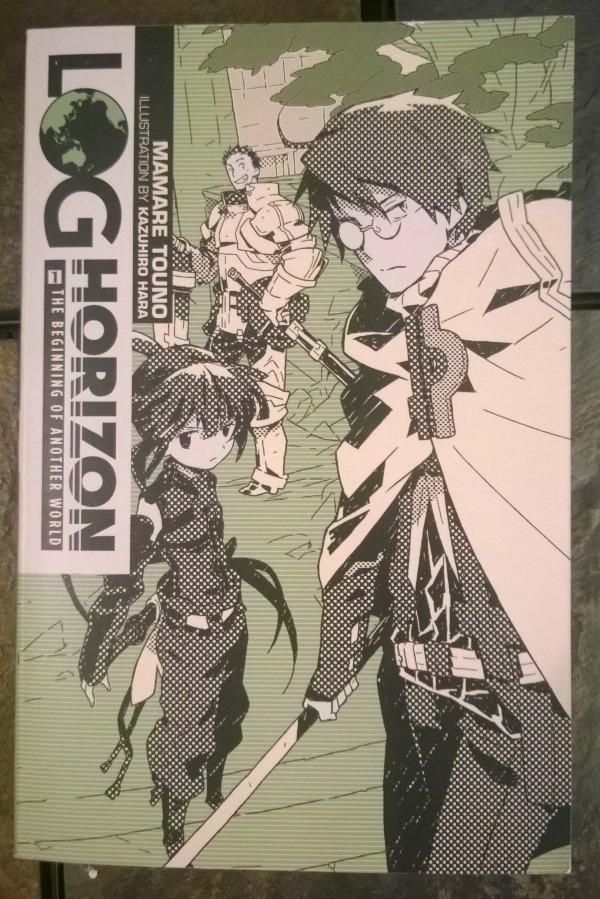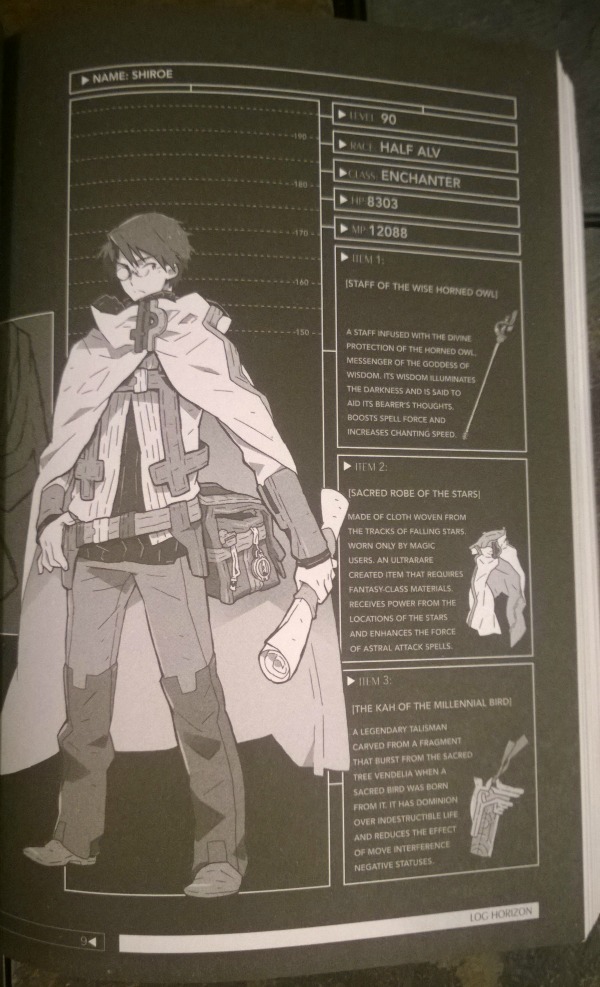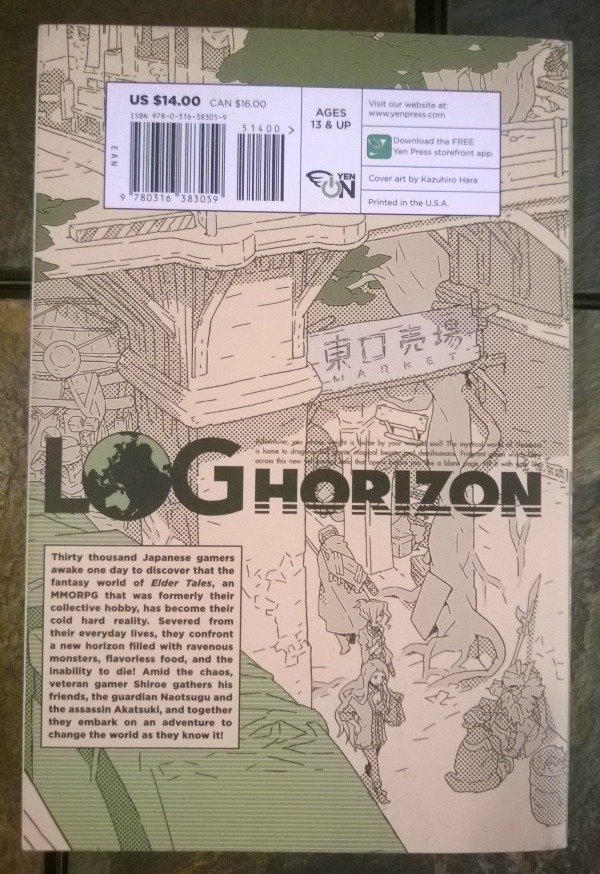Book Review: Log Horizon 1
Written by Mamare Touno, illustrated by Kazuhiro Hara, and published by Yen Press New York, Log Horizon 1: The Beginning of Another World is, quite literally, the story of a bunch of people stuck in a video game. Elder Tales is a massive multiplayer online roleplaying game, and it’s the most popular MMORPG in Japan. The latest expansion just launched and 30,000 Japanese gamers were lured into the digital world to enjoy their favorite hobby. Unfortunately, when the installation slider hit 100%, each and every one of those players found themselves physically transported into the digital world of Elder Tales. Shiroe, Naotsugu, and Akatsuki band together to protect themselves in a world utterly alien to them as they learn the new rules of their existence. After two weeks, all order has collapsed and, because death isn’t permanent, players are killing players with wanton abandon. In the chaos, Marielle approaches Shiroe and his friends and requests that they travel to the next city and rescue a member of her guild that has been trapped there.
Log Horizon was an impulse buy, as I’ve mentioned before. I picked it up because I’ve been planning on writing a book that centers around a digital world and I confess, I had no idea how I was going to do that. I figured I’d better pick up a few books and see how other authors are doing it. While this book will never make my favorites list (for reasons I’ll describe below), I found myself enjoying it’s lighter nature, characters, and artwork. I definitely want to know what happens and I will probably pick up the second volume when it is released in July, especially since most of the world-building has been done in this volume and the story can pick right up.
This book was originally published in Japan in 2011, and was translated and released in English in April 2015. For someone like me, who enjoys manga and anime, the cultural references were awkward at times, but at least understandable. For a reader who isn’t a fan of gamer culture and manga, this book would be entirely unapproachable. Log Horizon was definitely written for young Japanese men, as Shiroe and Naotsugu’s reactions to Marielle’s slightly perverse antics would be considered comedic in a manga. In a book, they are probably incredibly awkward for someone who isn’t familiar with the cultural background for this sort of gag.
My only real complaint about Log Horizon is that it’s really two books. The first third of the book is a world-building exercise, describing every mechanic of the world and how it compared to the computer interface. For example, Touno goes into great detail about how Shiroe can cast spells and abilities, talking about mentally visualizing icons, and describing what cooldowns are. It feels very much like unnecessary detail. I understand why some of these details are in the book, because the final plot hinges around Shiroe’s understanding and, ultimately his manipulation of, the game’s rules, but I can’t help but feel that the true fan-base of this book would have understood the climax without the explanation in the first chapters.
Of course, I’ll be honest and say that these world-building chapters were exciting to me, because this was exactly why I’d bought the book: to see how Mamare Touno had balanced his digital world and created consequences. That’s the key here, consequences. In a game, there are very few consequences these days. Usually, a failure in an MMO costs in-game currency and a little bit of time or progress. In the real world, death is more final. So how does Touno create consequence? In the real-life version of Elder Tales, Shiroe and the others can die, but they just respawn. Touno solves this in two ways. First, death in the game is psychologically traumatic (these are their real bodies now, after all). Second, players lose gear, which as any MMORPG player will tell you, is catastrophic! Lastly, players are attuned to the most recent city they’ve visited, so death forces a respawn at that city. It’s this last mechanic that is the really important one, since Shiroe’s band is trying to save a woman from another city. If they die en route, they have to start all over again. None of these consequences are really all that world-shattering, but the book carries a fairly light tone throughout, so I don’t see this as being a serious concern.
The second portion of the book is when the action starts and you really start to get an idea of characters and their motivation, and that’s where Log Horizon shines: in the action. Touno sets up a scenario in which the protagonist and his team must extract a single person from a hostile city and survive, because if any of them is killed, they’ll just respawn inside that hostile city, potentially trapped forever. The climax plays out like the epic battles in Naruto (I have to keep the anime / manga theme going, right?). There are a lot of moving parts going on behind the scenes, but you, as the reader, don’t get to see them until the end when everything comes together. That climax was exciting and scratched an itch in a way that I definitely want to check out the next volume and see if the author can keep the momentum going.
I also want to applaud Touno for his characters. For most Americans, Japanese names are difficult to pronounce, but seeing them on the written page helps the reader keep them straight, especially when each of the characters feels unique and alive in their own way. Shiroe is quiet and introspective and he remains so throughout the entire book. As the protagonist and point of view character for the majority of the book, this makes him feel inactive at times, but for all the right reasons. The book really starts when Shiroe heeds the call to action and volunteers for the rescue mission. Likewise, Naotsugu, Akatsuki, Marielle, and the others all feel unique. Even if you forget a character’s name, you can tie them to earlier events by their actions or colloquialisms.
In summary, Log Horizon 1: The Beginning of Another World is a niche book with a very specific audience. If you aren’t a fan of MMORPGs and Japanese manga / anime, I would argue that you should steer clear of this book. The cultural references for both genres will be too hard for you to understand and you’ll find yourself bored and potentially frustrated. If you are a fan of both and are interested, I’d encourage you to check it out, but only if you’re willing to shell out the $14.00 price tag, which is almost twice as much as what you’d pay for a trade paperback of the same length. That’s the cost of importing, translating, and illustrating books, though.
All in all, I’m content with my purchase and plan on picking up Log Horizon 2 when it releases on July 21, 2015.



